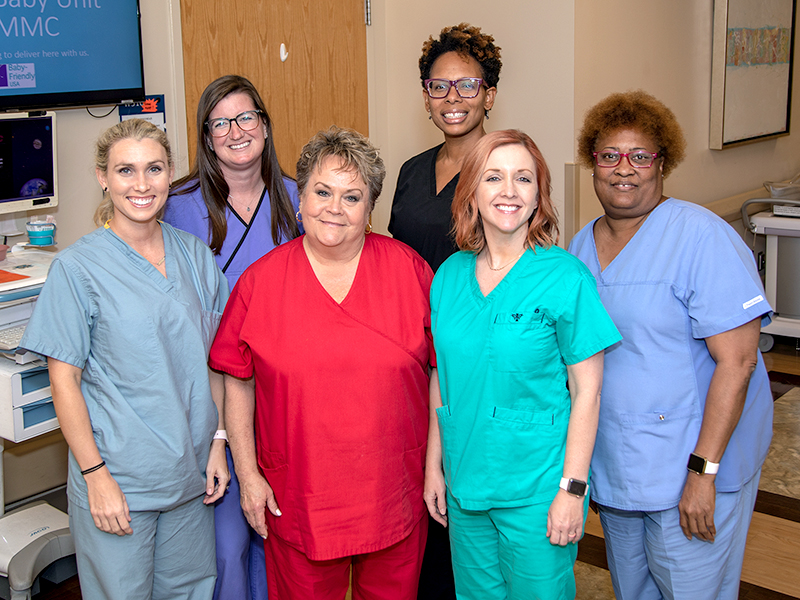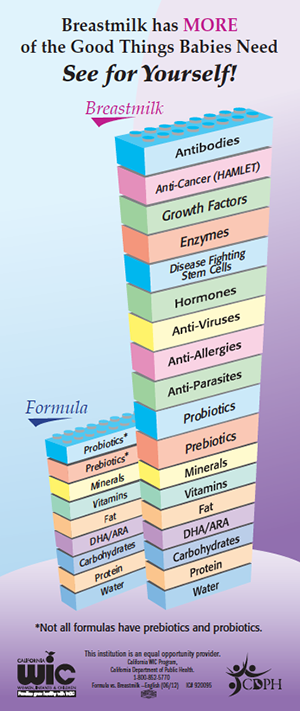Four ways formula falls short when compared to natural lactation
Women have been breastfeeding as long as there have been babies to feed. However, just because it’s a natural process doesn’t mean that it’s easy.
“I once had a mom call me at 4:30 a.m. looking for help feeding,” said Cheryl Lloyd, a registered nurse and board-certified lactation consultant at UMMC. “She didn’t know me from Adam, but found my name and number online in a list of certified lactation consultants.”
In Lloyd’s 20 years of experience, she said mothers-to-be who start learning about the benefits and best practices for breastfeeding before giving birth have an easier time getting started.
“Mothers may want to give breastfeeding a try, but don’t have the information that can help,” she said. “The more a mother knows coming in, the more successful she can be.”
Groups like La Leche League International or classes like those offered monthly at UMMC provide educational opportunities about breastfeeding. UMMC also has a number of other programs and resources for those who want help nursing.

UMMC's team of International Board Certified Lactation Consultants includes front row from left, Laurie McHenry, RN; Cheryl Lloyd, RN; Lauren Ryan, RN; Evora Knight, RN; back row, Marci Talbot, registered dietician and Valerie Stingley, RN.
Lloyd leads a team of lactation consultants at UMMC who aid new mothers in getting started, all of whom are certified by the International Board of Lactation Consultant Examiners. UMMC earned Baby-Friendly status from Baby-Friendly USA in 2017. Among other steps, Baby-Friendly birth centers help mothers breastfeed within one hour of birth.
Most recently, UMMC received a grant to start an interprofessional education program to teach students across all seven UMMC schools about the benefits of breastfeeding and how to help their future patients succeed.
Why choose breastfeeding instead of formula feeding? Biomedical research is documenting what lactation specialists like Lloyd have observed for years: Breastfeeding has multiple health benefits for infants.
Studies show that babies who are breastfed may later:
• Experience fewer ear infections,
• Be at less risk of Sudden Unexplained Infant Death and
• Have helped their development if born prematurely.
Lloyd noted one useful illustration for comparing the two feeding options: “Lego stack,” comparing the building blocks of formula and breastmilk.

Both contain water and macronutrients like fat, protein and carbohydrates, in addition to vitamins and minerals. That’s where the formula tower stops, while the breastmilk tower climbs higher with hormones, antibodies, enzymes, stem cells and microbes that promote healthy development.
Furthermore, some recent research suggests that pumped milk may not retain all of the components of milk drank directly from the breast, suggesting that immediate nursing may help pass along some of the health benefits.
The American Academy of Pediatrics and the World Health Organization both recommend that infants be exclusively breastfed for the first six months of life and continue to be breastfed past age 1 (AAP) or age 2 (WHO) as other foods are added to the diet.
Nursing for that long can be difficult for mothers, but Lloyd said even breastfeeding exclusively for just the first few days of life may confer some benefits: Those first feedings help seed the gut bacteria that establish a healthy digestive system.
Breastfeeding may also provide some cost savings – not just from avoiding the price of baby formula, but through fewer doctor’s visits.
A 2010 study in Pediatrics suggested that if all American mothers followed the AAP guidelines, the United States could save about $13 billion in health care and other costs each year.
“The benefits of breastfeeding for infants are not just for the right-now, there are positive effects for that child’s entire life,” Lloyd said.
For more information about UMMC’s classes for new and expectant parents, visit our website.
The above article appears in CONSULT, UMMC’s monthly e-newsletter sharing news about cutting-edge clinical and health science education advances and innovative biomedical research at the Medical Center and giving you tips and suggestions on how you and the people you love can live a healthier life. Click here and enter your email address to receive CONSULT free of charge. You may cancel at any time.



